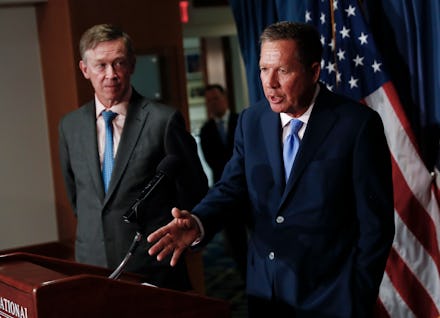These 3 Republican governors could pose the biggest threat to the Senate health care bill

On Tuesday, the New York Times reported that a group of governors from both sides of the aisle had "conspired privately for months" to thwart efforts by Republicans in Congress to repeal and replace the Affordable Care Act.
These efforts "helped stymie" Senate Majority Leader Mitch McConnell's ability to gather enough votes to pass the bill, the Times reported. On Tuesday, McConnell announced he would delay the vote until after the July 4 recess.
Senators considering voting for the bill will now head home, where some may face constituents angry with the prospect of losing their health insurance. According to an estimate by the non-partisan Congressional Budget Office, the bill would reduce the federal deficit by $321 billion over the next decade but cause 22 million Americans to lose coverage.
Senators in states with governors openly opposing the bill — especially if those governors are Republicans — may have an even harder time facing their constituents. Those same governors may also be able to convince their senators not to support the bill, which only 17% of Americans support. Here are the most critical Republican governors who have come out against it as of Wednesday afternoon.
Gov. John Kasich of Ohio
Kasich, who ran for the Republican presidential nomination in 2016 but lost to Donald Trump, was an early opponent of both the House and Senate health care bills and has been among the most vocal of the governors opposing Republicans' health care reform efforts.
In March, he, along with three other Republican governors, criticized the House's version of the bill, saying it didn't provide states with enough flexibility to meet the health care needs of their poorest residents.
Ohio was one of 32 states, including Washington, D.C., that expanded Medicaid coverage under the ACA. The Senate bill would reduce federal funding for Medicaid expansion, forcing states to foot more of the bill. States could end up spending as much as five times as much per Medicaid patient, according to the Washington Post.
On Tuesday, Kasich skewered the Senate version as well, calling it "not acceptable" and saying "it would leave a lot of people in a really difficult situation." He also called on the Senate to come up with a better solution, "even if they have to start over again."
Of particular concern to Kasich was the bill's lack of funding for treating drug addiction.
Ohio is one of the states hardest-hit by the opioid epidemic sweeping Middle America. In May, the state sued five major pharmaceutical manufacturers for creating what it called "a public health crisis the likes of which have been seen before." Among other things, the suit alleges that, in 2012, doctors prescribed enough opioids to "supply every man, woman and child in the state with 68 pills each." It also alleges that in 2016 around 20% of all Ohioans were prescribed an opioid.
After McConnell announced the vote would not happen until after the July 4 recess, Sen. Rob Portman of Ohio said he could not support the bill "in its current form."
Gov. Brian Sandoval of Nevada
In Nevada, another state hammered by the opioid crisis, Gov. Brian Sandoval stood beside Sen. Dean Heller — who is considered by some to be the most vulnerable GOP senator up for re-election in 2018 — at a press conference in Las Vegas as Heller said he would not vote for the bill.
"I think we can do better," Sandoval said of the bill, according to Politico. "If you don’t have access to meaningful health care and you can’t get the care that you need, nothing else really matters."
Like Ohio, Nevada expanded Medicaid under the ACA. Since its expansion, the number of Nevadans on Medicaid has grown by 203,900, according to the Kaiser Family Foundation, a nonpartisan health policy group.
The number of elderly people in Nevada is also growing. By 2030, a third of Nevadans could be seniors, Jeff Hardcastle, a demographer with the state of Nevada, told Nevada Public Radio in 2016.
The elderly would be hit particularly hard by the Senate bill; in 2015, Medicaid paid for 62% of those who lived in skilled nursing facilities, Quartz reported.
Gov. Doug Ducey of Arizona
Like Nevada, Arizona's population is getting older, so it comes as little surprise that Gov. Doug Ducey has raised concerns about the bill. Last Friday, Ducey said the bill "falls short," the Associated Press reported.
Arizona Sens. John McCain and Jeff Flake, both Republicans, said they would discuss the bill with Ducey before deciding how to vote.
Arizona's Medicaid agency said the bill would cost the state $7.1 billion over the next decade, as the federal government scales back funding for states like Arizona that expanded Medicaid early.
Still, Ducey has called the ACA a "disaster," the Arizona Republic reported, and McCain ran for reelection in 2016 on a promise to repeal it. But neither McCain nor Flake have said they will back the bill.